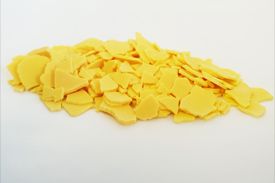
The chemical compound sodium sulphide has the formula Na2S. It is a crystalline, soluble in water solid that quickly collects moisture from the atmosphere due to its hygroscopic nature. When sodium sulfide interacts with acids, hydrogen sulfide gas is released, giving sodium sulfide its characteristic strong smell, which is similar to rotten eggs. Sodium sulfide anhydrous (Na2S) and sodium sulfide nonahydrate (Na2S·9H2O) are the two forms that are most often seen.
Usually utilized in industrial settings where extreme purity is not a top priority, the technical grade of sodium sulfide may have impurities that are acceptable for the intended usage. Due to its special qualities and adaptability, it may be used to meet important demands in a variety of sectors, including water treatment, chemicals, leather and textiles, pulp and paper, and pulp and paper.
Because sodium sulfide has several potentially dangerous characteristics, such as an odor and the ability to produce poisonous gasses, it must be handled carefully. It is imperative to follow appropriate safety protocols and handling techniques while handling this chemical.
Under IS standard IS 297: 2001, all sodium sulfide technical materials are now required to be listed in the ISI Certification Scheme.
The requirements and methods for testing and sampling technical-grade sodium sulfide are described in this standard. When the material is put through the testing procedures outlined in this standard's appendix, it must meet the criteria.
Without the ISI Mark, this product cannot be marketed, imported, or exported into the Indian consumer market.
Indian Standards Institute, or ISI was renamed the Bureau of Indian Standards (BIS) in 1987. The official mark that the Bureau of Indian Standards provides for manufacturers of various goods is the ISI Mark. It is used to indicate compliance with Indian standards (IS) set by the Bureau of Indian Standards (BIS) and has been used as a conformity marking for industrial products. Manufacturers received permission from BIS to use the ISI Mark on items that comply with relevant Indian requirements through the product certification program.
Only manufacturers (domestic or foreign) who produce the finished product will be awarded ISI Certification. This will not be given to any product importers, traders, dealers, or distributors.
The following documentation is required to get an ISI certification:
For more detailed information, please click here.
There are two approaches for Indian manufacturers to become certified with the ISI Mark:
Regular Procedure
With the possible exception of cases deemed "All India first," which might take up to 180 days, the licensing procedure is expected to be finished in 120 days. This timeline starts on the day the application is received, assuming that at different points in time the documentation, unit assessment, and product conformance are all deemed acceptable.
Step 1: Manufacturing Unit Customization in Compliance with Applicable Indian Standards
Step 2: Submission of the Application Form
For more detailed information, please click here.
Simplified Procedure
This is a much faster process than the standard procedure. After a factory inspection is deemed satisfactory and the initial evaluation establishes that the sample complies with the applicable Indian Standard(s), the license application process is expected to be finished in 30 days.
Step 1: Adapting the Manufacturing Unit to Comply with the Relevant Indian Standard
Step 2: Sample Testing
For more detailed information, please click here
The process of obtaining ISI Mark Certification for Foreign Manufacturers typically includes the following steps:
Step 1: Application
Step 2: Query Raised (If Any)
For more detailed information, please click here.
Brand Liaison provides helpful support for achieving ISI Mark Certification. Among our offerings are:
Please click here to get in contact with our team of specialists for a deeper explanation of the paperwork and steps needed to get ISI Mark Certification.